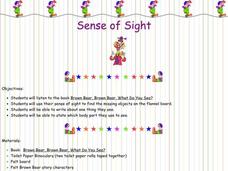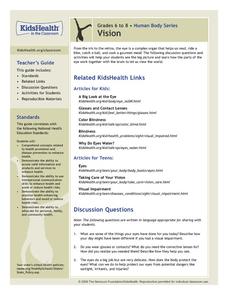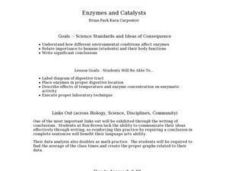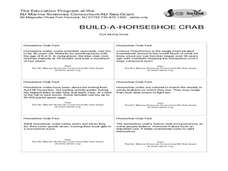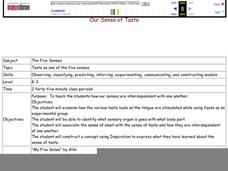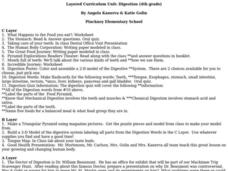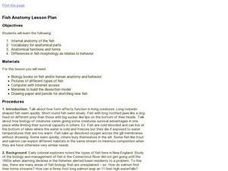Curated OER
Where Does Food Go?
Students understand how their food moves through the digestive system. In this digestion lesson plan, students measure the length of the digestive system from a projection of it. Students draw their own pictures of the digestive system.
Pennsylvania Department of Education
The Digestive System
Fourth graders simulate how the digestive system works. In this hands-on simulation, 4th graders complete six group activities that help students visualize how our body breaks down food into nutrients.
Messenger Education
Exploring Exploring
The reason people first began trading was because of their desires for objects other societies possessed. In the activity, classes discuss why exploration has been a common thread in all societies and where these desires have taken...
University of Minnesota
Dendritic Spines Lab
This is your brain on drugs ... literally! Your neuroscientists-in-training examine the evidence of drug use on the human brain and how neurons change their connectivity when altered by drugs. They then work together to create testing...
Curated OER
Bones, Bones, and More Bones
Young scholars describe the functions of bones in the human body. They describe the make up of a bone. They engage in a series of wonderful hands-on activitiies that reinforce learning of bones and the skeletal system.
Curated OER
Fish Fashion 101
Students explore fish anatomy. In this fish anatomy and adaptation lesson plan, students define and identify the location of fish body parts. Students add these parts of a fish's anatomy to a life-sized fish costume worn by a...
Curated OER
Sense of Hearing
Students explore the sense of hearing. In this human biology lesson, students listen to the story Polar Bear, Polar Bear, What Do You Hear? and give examples of how they use their sense of hearing everyday. Students pass around plastic...
Curated OER
Sense of Sight
Students examine the sense of sight. In this human biology lesson, students read the book Brown Bear, Brown Bear, What Do You See? and discuss all of the animals seen in the story. Students use binoculars and take several digital photos...
Nemours KidsHealth
Vision
From the iris and retina to glasses and contact lenses, learners will be excited to see what activities are in store for them as they learn about the complex organ of the human eye.
University of Arizona
The Leg Bone Is Connected to The...
Students discover the names of 13 major bones in the human skeletal system. They construct their skeleton using paper plates and other simple products. Links to templates are provided within the resource.
Curated OER
Fulcrums in Our Body
Second graders discuss fulcrums and levers and identify at least two fulcrums and levers on their bodies. They also identify fulcrums and levers on animal bodies.
Curated OER
Frogs
Students explore the external and internal structures of an amphibian and how frog anatomy compares to human anatomy. They collect pictures of a frog using a digital camera, create a web page, develop a PowerPoint presentation, and...
Curated OER
Cell Parts
Students identify parts of a cell. In this biology lesson, students create a simulated cell by using Jell-o, fruit roll ups, raisins, gum drops, and M&M's. Students construct the simulated cell and identify each part.
Curated OER
Tall Tales
Students examine the characteristics of tall tales and how exaggerations are used. They create a character that is larger than life, they brainstorm attributes for their character, before writing a Tall Tale. They plan out their story,...
Curated OER
Can You Name Parts of the Body?
Students share what they know about the human heart. In this early anatomy lesson, students discuss the location, shape, and importance of the human heart.
Curated OER
Enzymes and Catalysts
Students discuss the functioning of the digestive system and the specific enzymes present. They observe the action of amylase on starch to identify characteristics of enzymes then perform an experiment on the effects of temperature on...
Curated OER
Physical Adaptations in Ice Age Mammals
Students identify the body parts in Ice Age mammals that allowed them to survive. They answer questions as a class and discuss. They examine photographs of the animals as well.
Curated OER
Build-A-Horseshoe Crab
Students discover many facts about horseshoe crabs. Students identify the main body parts of horseshoe crab. They explore the habits of the horseshoe crab and their importances to the ecosystem. Adaptations for younger students are...
Curated OER
All in the Family: Calculating Cousins
Students view pictures of distant "cousins" to humans. They place them in order by their distance from humans. Students receive a packet of six pages featuring graphics and a cousins summary page. They work in groups to complete 5 cousin...
Curated OER
Our Sense of Taste
Students explore the relationship between the senses of taste and smell using a blindfold taste test. In partners, they taste different foods with their noses plugged and unplugged. They create a life size outline of the human body to...
Curated OER
Digestion
Fourth graders answer the question what happens to the food you eat? They complete a worksheet about the food you eat. They discuss the different types of teeth that we have. Students complete digestion poster in which they color and...
Curated OER
Fish Anatomy
Students identify and interpret the internal anatomy of the fish. They also identify and define vocabulary for anatomical parts and anatomical functions and forms. Finally, students identify and interpret the differences in fish...
King Country
Lesson 2: Private & Public
What is the difference between a private and a public place? The focus in this second lesson on family life and sexual health is building an understanding of the difference between the concepts of private and public and the...
University of Minnesota
Sheep Brain Dissection
Bored with frog and earthworm dissections? Had your fill of fetal pigs? Anatomy students will be intrigued by the sheep's brain, and you will be prepared with guiding questions, extension activities, and pictures as they dissect one —...







